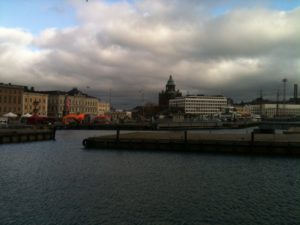 Fraser and Iona report (November 2015):
Fraser and Iona report (November 2015):
Six members of the Linguistic DNA team were present at the recent d2e conference held by the VARIENG research unit at the University of Helsinki, Finland. The focus of the conference was on tools and methodologies employed in corpus linguistics, whilst the event took for its theme ‘big data, rich data, uncharted data’. The conference offered much food for thought, raising our awareness of the tools and methods employed by other researchers in similar fields. Frequently it was clear that despite the differences between the goals of, for example, sociolinguistics and historical semantics, the knowledge and approach towards data taken by one could be effectively and productively applied to another.
The conference’s plenary speeches were of particular interest. Tony McEnery delineated potential limitations of corpus data and its analysis. His call for researchers to remain aware of the limitations of their data struck a chord with our findings from close examination of EEBO data in its raw and processed forms. One of his main conclusions was the importance of conducting cyclical research—analysing the data with software tools and then returning to the data itself to verify the validity of the findings. LDNA is set up to follow this approach, and Professor McEnery’s presentation reaffirmed its importance. Plenaries by Jane Winters and Päivi Pahta looked further into working with historical data and—in the latter particularly—historical linguistic data, whilst a fascinating presentation by Mark Davies emphasised the importance of corpus size in the type of research which we are undertaking.
LDNA is also taking an active interest in innovative approaches to data analysis and visualisation. Demonstrating software, Gerold Schneider, Eetu Mäkelä, and Jonathan Hope each showcased new tools for representing historical language data and wrangling with metadata. As we progress in our thinking about the kinds of processing which will allow us to identify concepts in our data, we are always on the lookout for ideas and methodological developments which might help us to improve our own findings.
Several research papers connected with the interests of LDNA, especially when they adhered closely to the conference’s theme of exploring large and complex datasets in ways which reveal new patterns in the data. James McCracken’s presentation on adding frequency information to the Oxford English Dictionary was very exciting for the possibilities it could open up to future historical linguistics. (We’ve blogged before about the drawback of not having relevant frequency data when using tools like VARD.) Meanwhile, the techniques used to track change in words’ behaviour, with different dimensions of semantic evolution scrutinised by Hendrik De Smet (for Hansard), Gerold Schneider (in COHA), and Hannah Kermes and Stephania Degaetano-Ortlieb of Saarland University (working with the Royal Scientific Corpus) were not only intrinsically fascinating but provide useful pointers towards the depth and complexity of linguistic features LDNA will need to consider. We will also aim to keep in view Joseph Flanagan’s insistence that linguistic studies should aim for reproducibility, an insistence aided (for those who code with R) by the suite of tools he recommended.
The d2e conference packed a lot into a few days, creating an intense and productive atmosphere in which participants could meet, exchange ideas, and become more aware of the scope of others’ work in related fields. We enjoyed the conversations around our own poster, and much appreciated the hospitality throughout. It was a great opportunity for the LDNA team, providing more invaluable input to our thought and approach to our work.
——-
Abstracts from the conference are available from the d2e pages on the Varieng website.
Anni Aarinen provides a write-up of McEnery’s keynote.
Glasgow-based LDNA member Brian Aitken has written up his d2e experience on the Digital Humanities blog.